- Home
- About
- Student Led
- Research Informed
- Practice Focused
- Resources
- News
- Green Campus Podcasts
- Case Studies
- Green Labs Community
News
Energy Security & Climate Transitions: Is LNG The Answer?
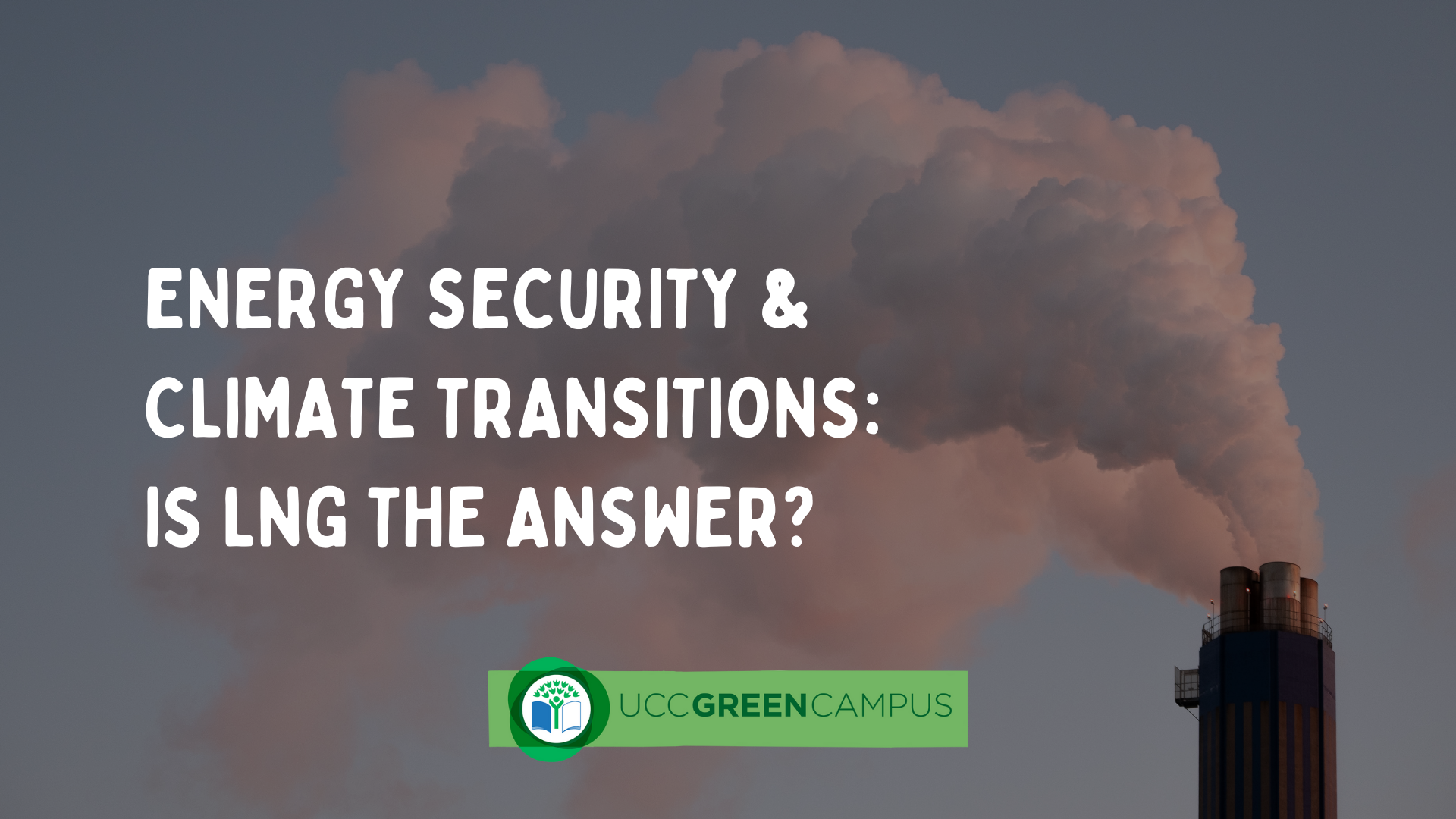
Written by By Niamh Guiry.
It has been 3 months since Russia invaded Ukraine, and the humanitarian, geopolitical, food, energy, and security impacts of this invasion are having far-reaching consequences on our world.
As of 22nd May 2022, 3,930 civilians have died as a result of Russia's military attack on Ukraine, 257 of those deaths were children[1]. Millions of people have been displaced and forced to flee their homes, and the Russian-Ukraine war is exacerbating the global hunger crisis. Speaking at a food security meeting last week, U.N. Secretary-General António Guterres said that the war ‘tip tens of millions of people over the edge into food insecurity, followed by malnutrition, mass hunger, and famine, in a crisis that could last for years’[2]. The war continues to rage on and the situation in Ukraine remains unpredictable and devastating.
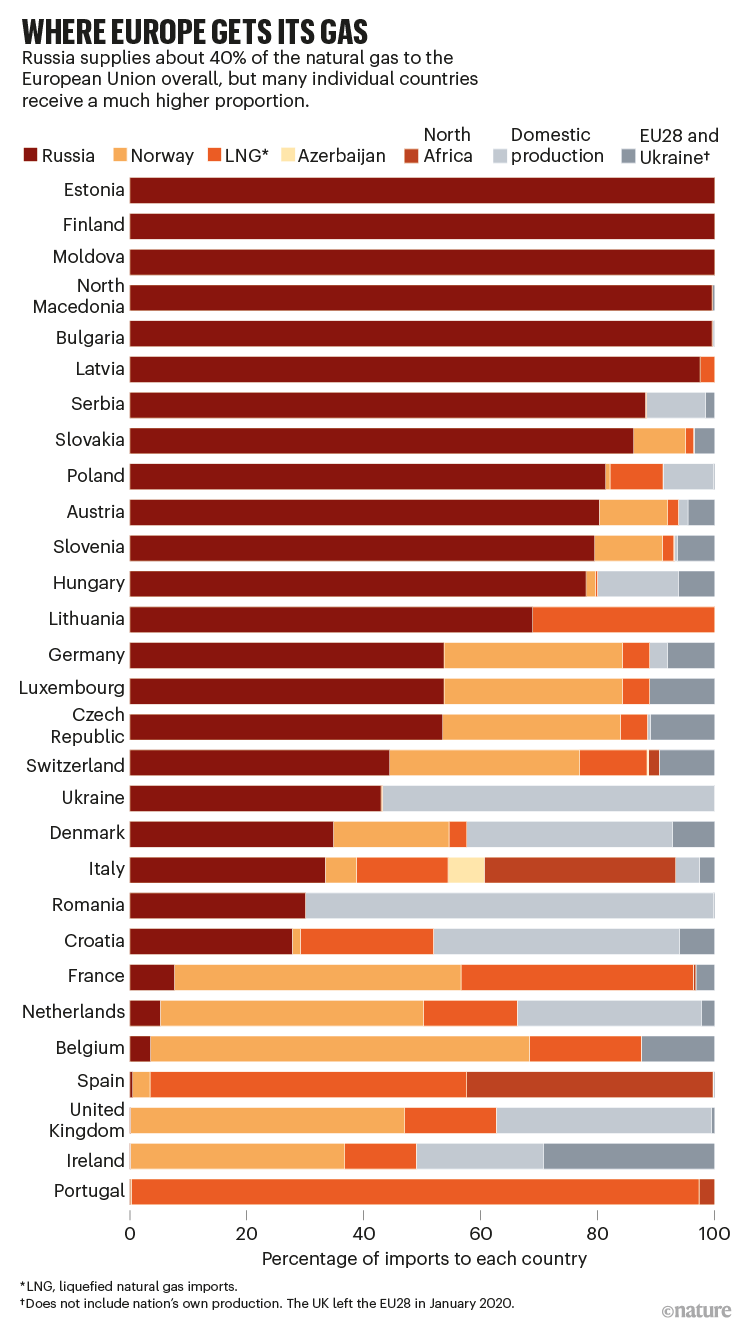
Alongside the most shocking humanitarian crisis Europe has experienced in decades, the Russia-Ukraine war has disrupted the energy market to a degree that has not been seen since the oil crisis in the 1970s. Russia is an ‘energy giant’[3] that produces 14% of the world's oil supply[4] and almost 17% of the world's gas[5]. Some EU States are more dependent on Russian energy sources than others. Countries like Ireland, Portugal, and Belgium use much less Russian gas in comparison to Estonia or Finland, and many States are currently working to find suitable energy alternatives. In Germany, for example, an estimated 50-75% of Germany’s gas imports in 2021 came from Russia[6] and government officials are currently putting plans in place to help prepare for a sudden halt in Russian gas supplies[7].
Energy security, affordability, and Europe's reliance on Russian energy supplies are pressing issues that are sparking discussion and debate amongst political leaders and citizens alike. In Ireland, the government has launched a National Energy Security Framework to monitor our energy supplies and explore Ireland’s energy security needs in the context of the war in Ukraine. The energy crisis has generated a tidal wave of discourse in the media around what resources and infrastructure Ireland should focus on developing. Liquified Natural Gas (LNG) has received significant attention in energy conversations, with some calling for the immediate development of LNG infrastructure to ensure Ireland’s energy security[8], while others see this as an opportunity to invest in indigenous energy resources.
But what exactly is LNG and is it a viable option for Ireland in the age of war and anthropogenic climate change?
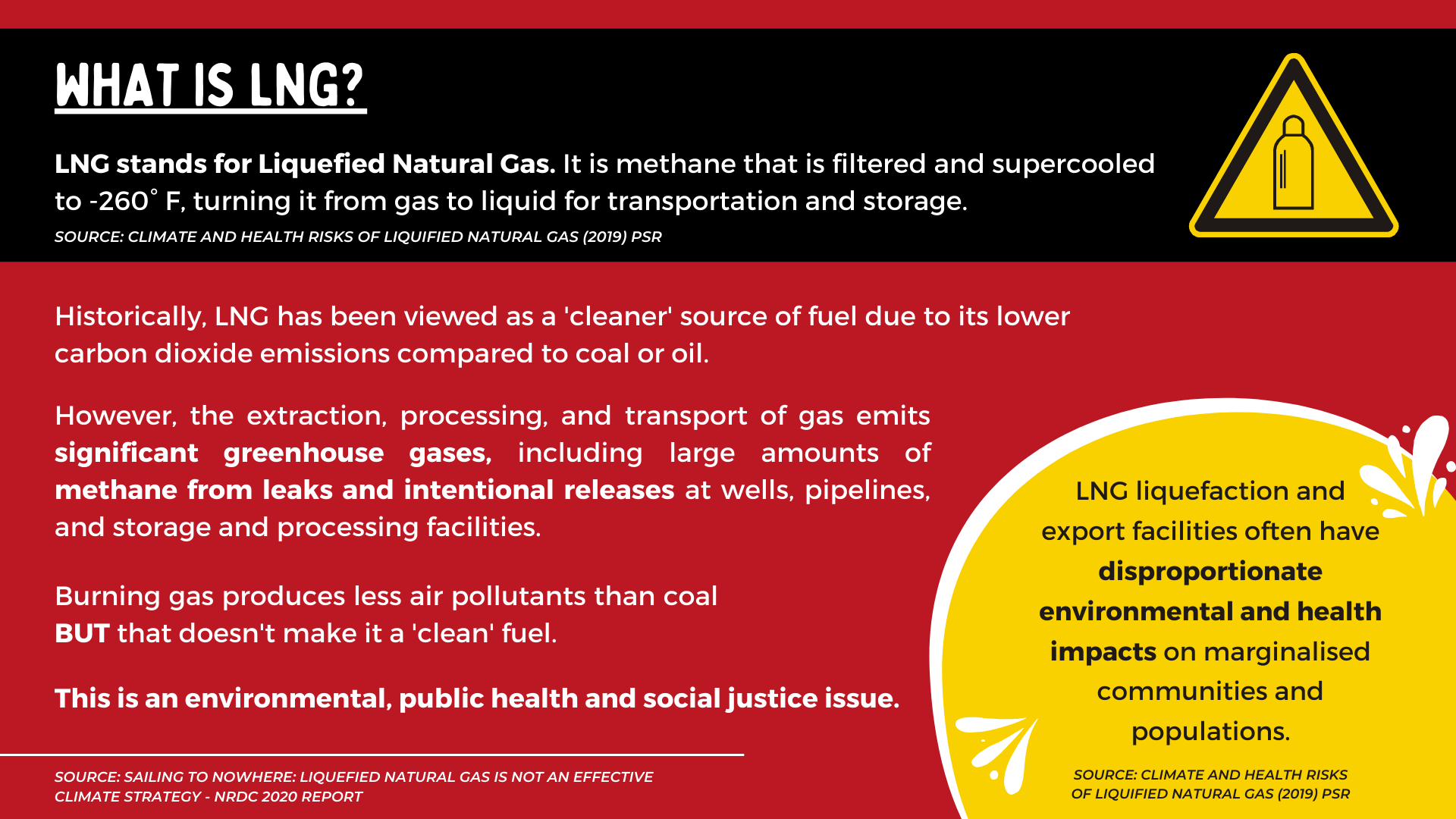
The Ins & Outs of LNG
LNG is methane (a potent greenhouse gas) that has been filtered and supercooled to -260° F, turning it from gas to liquid. The liquefaction process reduces the gas’ volume by 600 times, making it easier to store and transport in large quantities[9]. LNG is often viewed as a ‘cleaner’ fossil fuel as it emits lower levels of carbon dioxide than coal when burned. However, there are a range of environmental, health, and social injustice issues associated with LNG production.
The extraction, conversion, and transportation processes associated with LNG emit large amounts of methane. Over a 20-year period, methane is 80 times more potent at warming global temperatures compared to carbon dioxide[10]. Global concentrations of carbon dioxide, methane, and nitrous oxide have increased to unprecedented levels in recent years[11], and these methane emissions combined with additional greenhouse gas production associated with overseas exportation of LNG raises serious issues with this fuel being relied on in the energy transition[12].
British oil giant BP markets LNG as a central resource for the energy transition and claims that it will play a key role in the company’s journey to ‘#net zero by 2050’[13], despite offering few details on how this goal will be achieved. While the BP sustainability marketing is extensive, one finds it difficult to trust statements from fossil fuel leviathans that continue to profit off the climate crisis[14], spend millions lobbying to block climate change policies[15], and have a significant history of greenwashing[16].
Fracking is a destructive drilling technique that fractures bedrock using pressurised liquid to extract oil, gas, geothermal energy, or water from the earth. There is a range of environmental justice issues associated with these activities, and historically marginalised communities suffer the most as a result of fracking. Fracking contaminates water, pollutes air, threatens public health, causes earthquakes, harms local economies, and decreases property values[17]. Emerging evidence shows that living near fracking activities can cause harm to maternal health and shortened lifespans among older residents[18]. While offshore fracking of gas in Ireland has been banned since 2017 due to the environmental risk it poses[19], proposed LNG terminals on the Shannon Estuary may very likely involve the importation of fracked gas[20]. By importing fracked gas, we support a system that harms communities and the environment.
The construction of new LNG terminals is not necessary for energy security in Ireland. Reliance on LNG as an energy source risk increasing our economy’s exposure to energy price volatility and leaves us more vulnerable to geopolitical disruptions in the future[21]. Simply moving our dependence from one fossil fuel source to another will not fix Ireland’s (or Europe's) energy problems[22]. Discussions around LNG usually lead to the suggestion that LNG terminals and pipelines can be used for hydrogen in the future. However, the differences in physical and chemical properties between hydrogen and natural gas mean that this process is neither straightforward nor guaranteed to be successful[23].
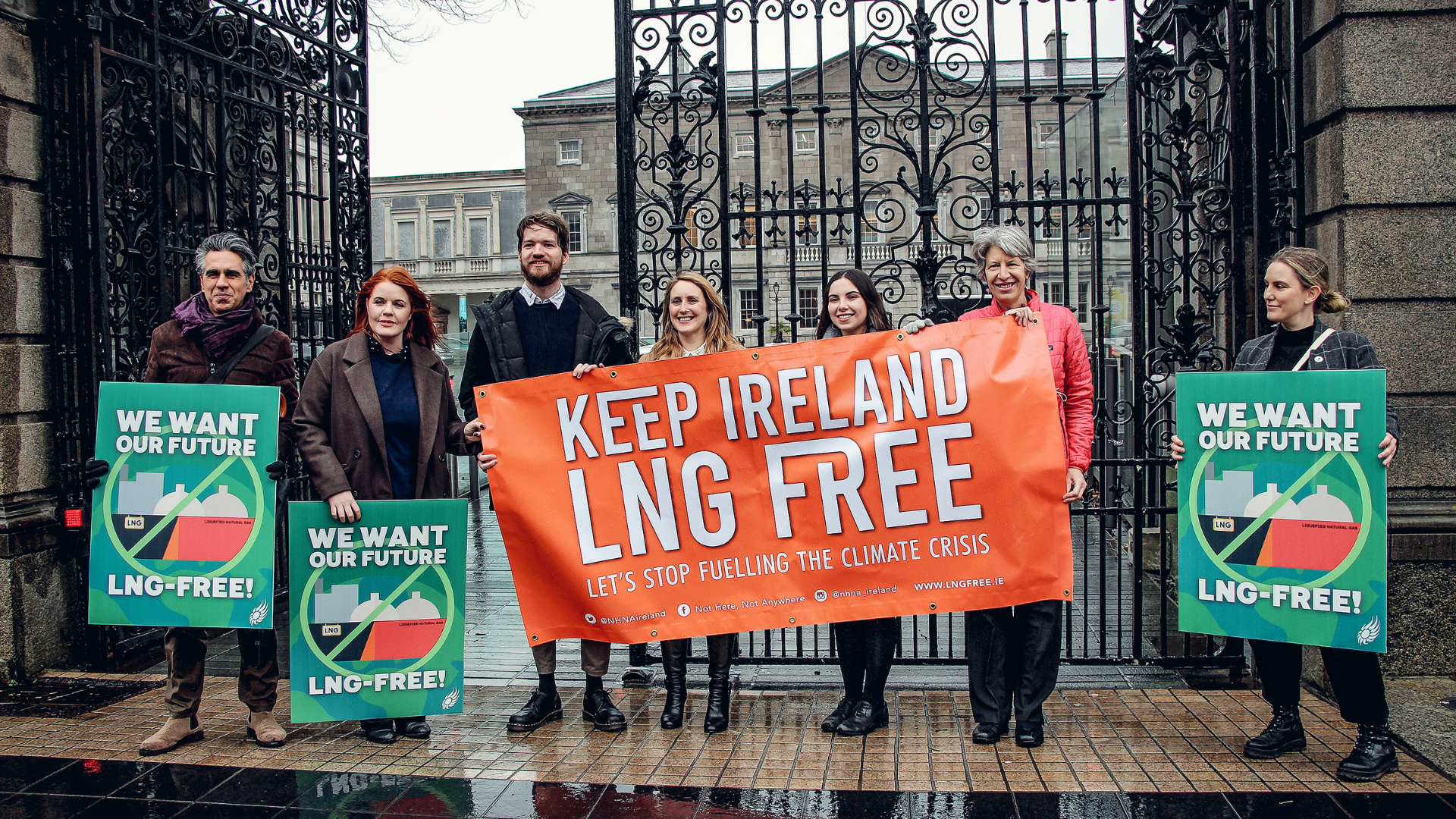
Keep Ireland LNG Free
LNG has been a topic of debate, locally and nationally, for several years. In 2017, the Port of Cork signed a Memorandum of Understanding (MoU) with NextDecade, which would have allowed this company to develop a new Floating Storage and Regasification Unit and associated LNG import terminal infrastructure in Cork harbour. This decision triggered significant opposition from individuals, grassroots groups, and NGOs on a local, national, and international level. Thanks to the petitions, protests, motions brought forward to Local Authorities in Cork, and political action, the MoU expired in 2020 and the Port of Cork stated that they have no intention to renew this development[24].
One of the groups involved in the fight against Cork LNG was Not Here Not Anywhere (NHNA). NHNA is a nation-wide grassroots organisation run by a group of enthusiastic and dedicated volunteers who are campaigning to end fossil fuel exploration and the development of new fossil fuel infrastructure in Ireland. They advocate for a just transition to renewable energy systems, both in Ireland and further afield.
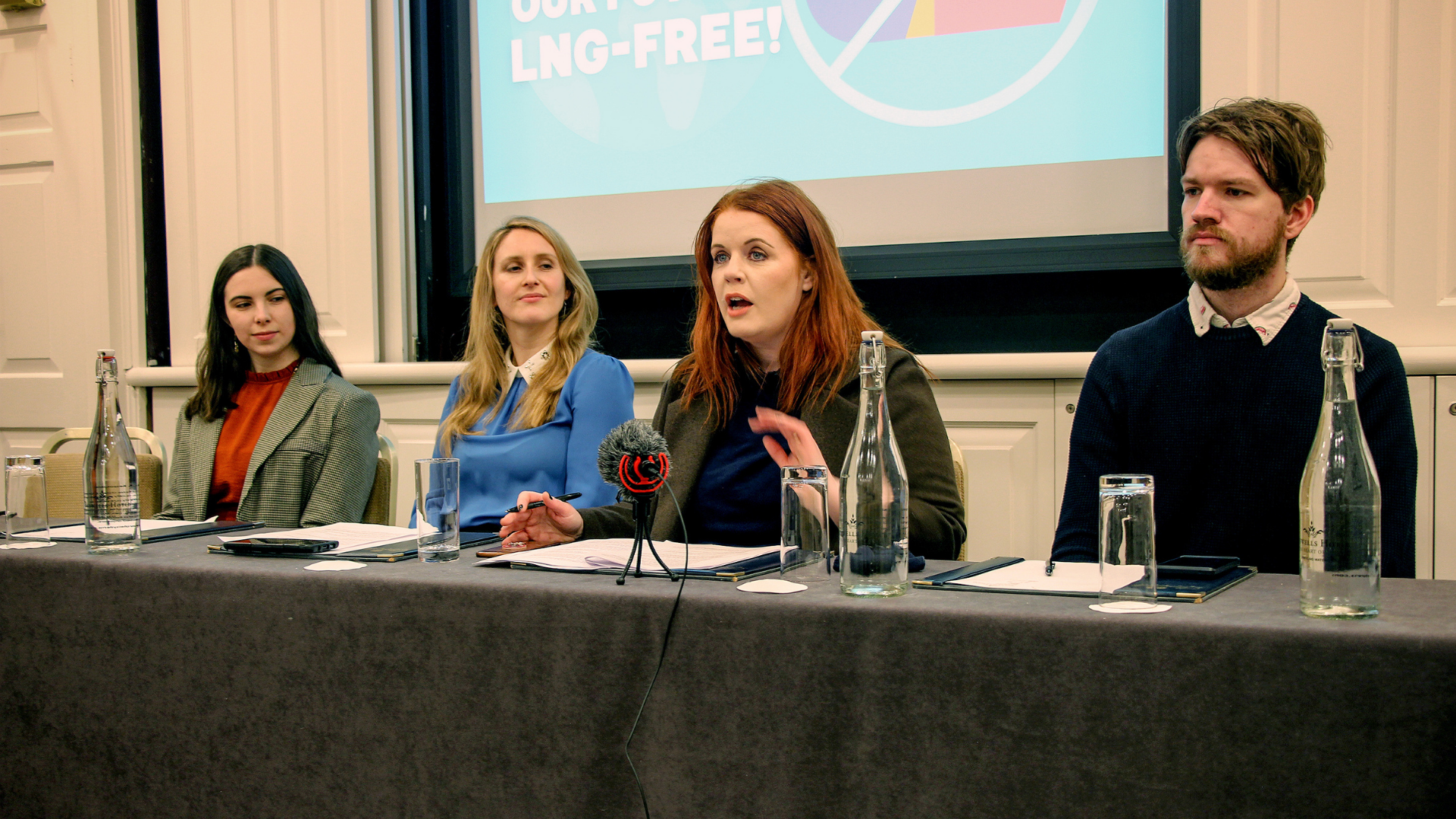
In light of indisputable climate science and the critical need to phase out fossil fuels before the end of this decade, NHNA launched their latest campaign Keep Ireland LNG Free on 18th February 2022. The NHNA members wrote the LNG Bill, which seeks to amend the existing Planning and Development Act 2000 to ban the development of LNG infrastructure in Ireland and remove LNG infrastructure from listing as strategic infrastructure projects. Over 30 national and international civil society organisations have pledged to support the campaign and the Bill was brought forward as a Private Member’s Bill by sponsor TD Neasa Hourigan[25].
There are 4 LNG terminals proposed for development across Ireland (Shannon, Cork, Mayo, and Louth). We have a moral and legal duty to keep global temperatures below the 1.5 °C increase. These developments would lock us into fossil fuel dependency for another 30 years[26], which would endanger the possibility of Ireland realising its critical climate targets and risk costs of living and fuel rising further in the future.
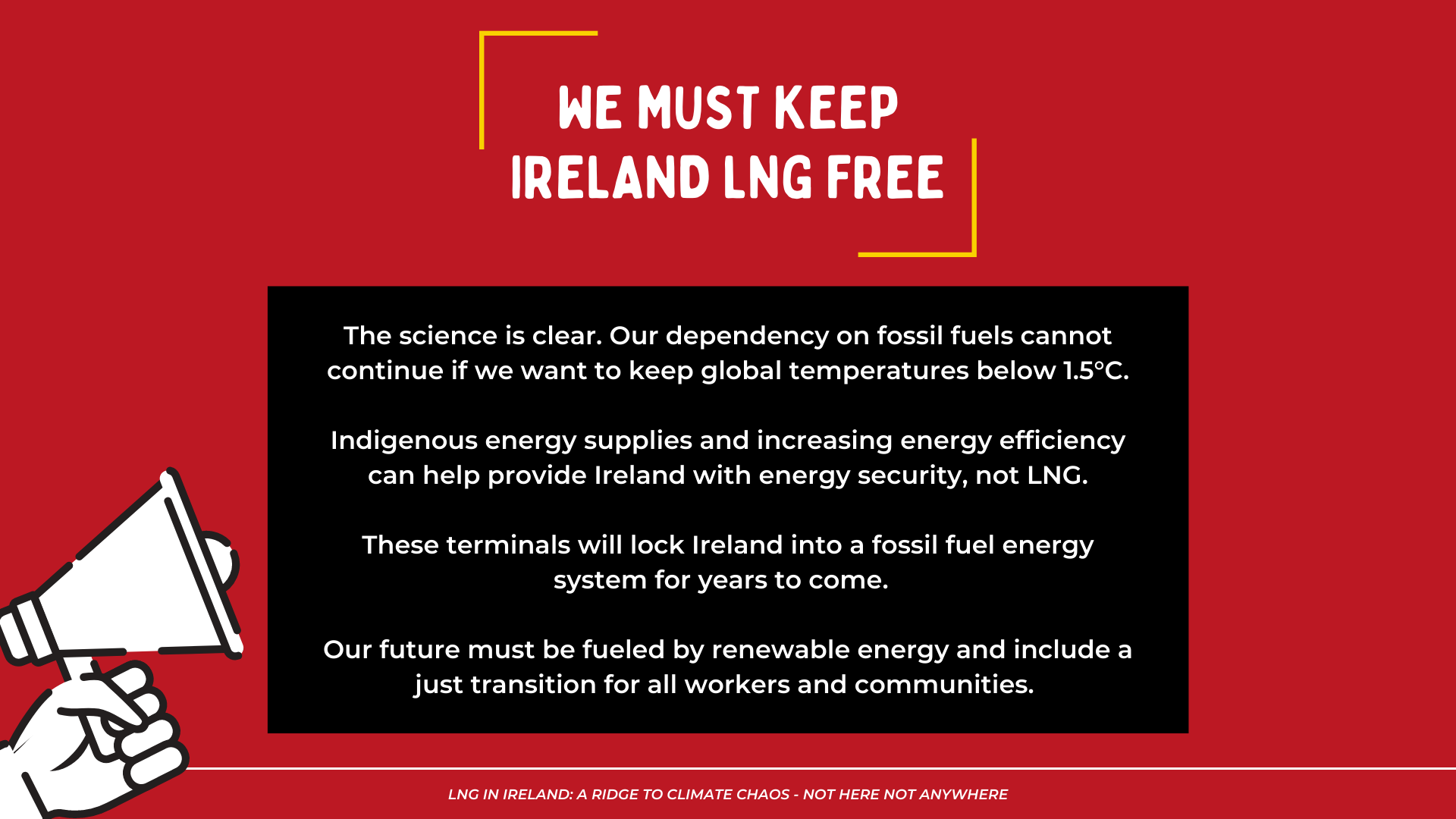
Ireland’s Energy Future
Strong political support and momentum are urgently required to facilitate the delivery of a renewable energy transition. In a letter to their Green Party counterparts in 2020, Fianna Fáil and Fine Gael noted; ‘Both of our parties accept that as we move towards carbon neutrality, it does not make sense to build new large scale fossil fuel infrastructure such as liquefied natural gas import terminals’[27]. However, with current energy pressures at play, some politicians are suggesting we back-track on our progress, going so far as to suggest that the Programme for Government should be re-drafted to allow for LNG[28].
If we want to meet our global climate targets and prevent catastrophic climate change, we cannot continue developing fossil fuel infrastructure. The Climate Change Advisory Council published a letter to the Government in April 2022 which raises the concern that critical climate targets are not being fully considered when developing short-term responses to energy security issues. The Council outlined that the war in Ukraine ‘further emphasises the urgency with which we need to reduce our reliance on imported fossil fuels’[29].
Ireland’s 2050 net-zero emission targets must be at the centre of every energy decision we make. Given the potential of Ireland’s indigenous energy sources, a Stop Climate Chaos report found that a rapid fossil fuel phase-out is both technically feasible and can progressively eliminate the energy security risks associated with imported fossil fuels if accompanied by adequate public and political support for the transition[30]. As the latest IPCC report made abundantly clear, the time to act is now and for the good of our people and planet, we cannot afford to delay any longer.
NHNA has a petition that individuals can sign to show their support for the Bill and to support the campaign, you can lobby your political representatives to sign the NHNA Pledge: For climate, for communities, and for a safe and secure future, we must Keep Ireland LNG Free. I oppose the development of LNG terminals in Ireland.
[1] Statistica, ‘Number of civilian casualties in Ukraine during Russia's invasion verified by OHCHR as of May 22, 2022’ https://www.statista.com/statistics/1293492/ukraine-war-casualties/
[2] ‘Ukraine war stokes global food crisis that could last years, says UN’ Irish Times (19 May 2022)
[3] McBride, J., ‘Russia’s Energy Role in Europe: What’s at Stake With the Ukraine Crisis’ Council on Foreign Relations (22 February 2022)
https://www.cfr.org/in-brief/russias-energy-role-europe-whats-stake-ukraine-crisis
[4] IEA, ‘Energy Fact Sheet: Why does Russian oil and gas matter?’ (21 March 2022) https://www.iea.org/articles/energy-fact-sheet-why-does-russian-oil-and-gas-matter
[5] BP, Statistical Review of World Energy (2021) https://www.bp.com/content/dam/bp/business-sites/en/global/corporate/pdfs/energy-economics/statistical-review/bp-stats-review-2021-full-report.pdf
[6] Eurostat, ‘EU imports of energy products - recent developments’ (April 2022)
[7] O’Donnell, J., ‘Germany prepares crisis plan for abrupt end to Russian gas’ Reuters (10 May 2022) https://www.reuters.com/business/energy/exclusive-germany-prepares-crisis-plan-abrupt-end-russian-gas-sources-2022-05-09/
[8] See O’Sullivan, K., ‘Ireland needs LNG infrastructure to ensure energy security, says regulator’ Irish Times (30 March 2022) https://www.irishtimes.com/business/energy-and-resources/ireland-needs-lng-infrastructure-to-ensure-energy-security-says-regulator-1.4839610;
[9] Physicians For Social Responsibility, Climate and Health Risks of Liquified Natural Gas (2019)
https://www.psr.org/wp-content/uploads/2019/11/LNG-WHITE-PAPER-11262019.pdf
[10] United Nations Environment Programme, ’Methane emissions are driving climate change. Here’s how to reduce them’ https://www.unep.org/news-and-stories/story/methane-emissions-are-driving-climate-change-heres-how-reduce-them
[11] IPCC, Climate Change 2021: The Physical Science Basis - Technical Summary (2021) https://www.ipcc.ch/report/ar6/wg1/downloads/report/IPCC_AR6_WGI_TS.pdf
[12] Abrahams, L. S., et al., ’Life Cycle Greenhouse Gas Emissions From U.S. Liquefied Natural Gas Exports: Implications for End Uses’ Environmental Science & Technology 49, 5 (2015)
https://pubs.acs.org/doi/pdf/10.1021/es505617p
[13] BP, ’LNG - innovative energy solutions’ (2022)
[14] Milman, O., ’Largest oil and gas producers made close to $100bn in first quarter of 2022’ (13 May 2022)
https://www.theguardian.com/business/2022/may/13/oil-gas-producers-first-quarter-2022-profits
[15] Lanville, S.,’ Top oil firms spending millions lobbying to block climate change policies, says report’ The Guardian (22 March 2019)
[16] See Client Earth, ’BP greenwashing complaint sets precedent for action on misleading ad campaigns’ (17 June 2020) https://www.clientearth.org/latest/latest-updates/news/bp-greenwashing-complaint-sets-precedent-for-action-on-misleading-ad-campaigns/ ; Kassinis, G., and Panayiotou, A., ’Visuality as Greenwashing: The Case of BP and Deepwater Horizon’ Organization & Environment 31, 1 (2018), pp. 25-47 https://doi.org/10.1177/1086026616687014
[17] Friends of the Earth Europe, LNG: The Liquid Path To Climate Chaos (2022)
https://www.foe.ie/assets/files/pdf/lng_liquified_path_climate_chaos.pdf
[18] Concerned Health Professionals of New York and Physicians for Social Responsibility, Compendium of Scientific, Medical, and Media Findings Demonstrating Risks and Harms of Fracking and Associated Gas and Oil Infrastructure (2022) https://www.psr.org/wp-content/uploads/2022/04/compendium-8.pdf
[19] Department of the Environment, Climate and Communications, ’Policy Statement on the Importation of Fracked Gas‘ (18 May 2021) https://www.gov.ie/en/press-release/dbe48-policy-statement-on-the-importation-of-fracked-gas-published/#:~:text=Fracked%20gas%20is%20natural%20gas,the%20environmental%20risk%20it%20poses.
[20] Not Here Not Anywhere, ’LNG In Ireland: Policy Document’
https://drive.google.com/file/d/1K2V9WmvPVKfTNpaHZh5DBA1eZa4rlOrw/view
[21] Curran, I.,’'More natural gas does not mean more energy security for Ireland,' Dáil committee hears’ The Journal (19 March 2022) https://www.thejournal.ie/gas-security-energy-climate-5723944-Mar2022/
[22] Friends of the Earth Europe, LNG: The Liquid Path To Climate Chaos (2022)
https://www.foe.ie/assets/files/pdf/lng_liquified_path_climate_chaos.pdf
[23] Mikulka, J., ’Decoding the Hype Behind the Natural Gas Industry’s Hydrogen Push’ DeSmog (14 January 2021) https://www.desmog.com/2021/01/14/decoding-hype-behind-natural-gas-industry-hydrogen-push/ ; Friends of the Earth Europe, LNG: The Liquid Path To Climate Chaos (2022)
https://www.foe.ie/assets/files/pdf/lng_liquified_path_climate_chaos.pdf
[24] Not Here Not Anywhere, ’Cork LNG’ https://notherenotanywhere.com/what-is-lng/
[25] Neasa Hourigan TD Dublin Central ’Bill to Keep Ireland LNG Free’
https://www.youtube.com/watch?v=bNCuWxWNDi4&t=4s
[26] LNG Free - About https://www.lngfree.ie/about
[27] Letter by Leo Varadkar and Micheál Martin https://www.rte.ie/documents/news/2020/04/greens-response-final.pdf
[28] Loughlin, E.,’ It's gas that three letters could spell RIP for coalition Government’ Irish Examiner (5 April 2022) https://www.irishexaminer.com/opinion/columnists/arid-40844420.html
[29] Climate Change Advisory Council, ‘Energy Security and Climate Action’ (12th April 2022) https://www.climatecouncil.ie/media/climatechangeadvisorycouncil/contentassets/documents/news/CCAC%20Letter%20to%20Government.pdf
[30] McMullin, B., et al., ’Is Natural Gas “Essential for Ireland’s Future Energy Security”? A Critical Response to the Irish Academy of Engineering‘ (2018)
